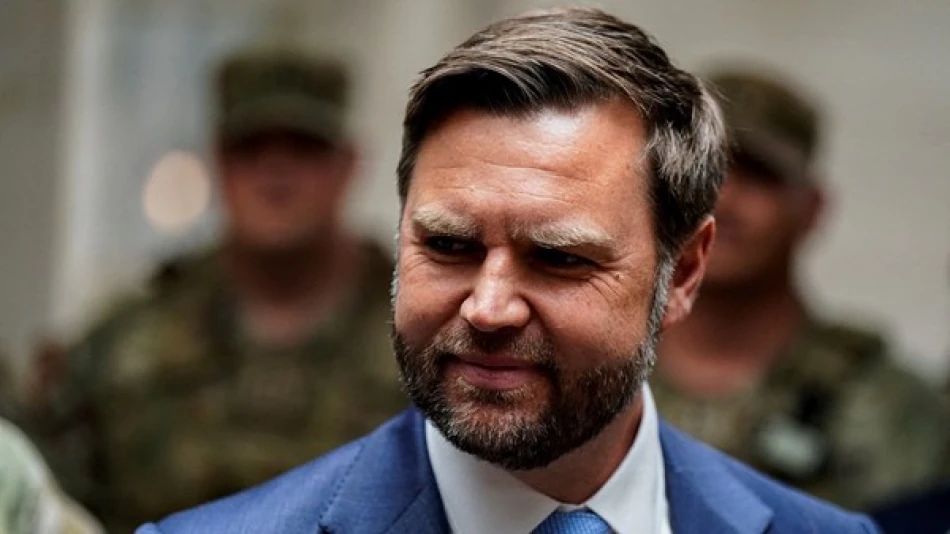
Vance Provides Assurances on Ukraine's Security Guarantees
Vance Signals Europe Must Lead Ukraine Security as Trump Administration Pursues Peace Deal
US Vice President JD Vance has declared that Europe should shoulder the "lion's share of the burden" for Ukraine's long-term security, marking a decisive shift in American strategy as the Trump administration pushes for a negotiated end to the conflict that began in February 2022. The statement signals Washington's intent to step back from its leading role in European security affairs while maintaining influence over peace negotiations.
America's Strategic Pivot Away from European Leadership
In a Fox News interview, Vance made clear that the United States will not carry the primary responsibility for Ukraine's future security arrangements. "I don't think we should bear the burden here," he stated. "This is their continent. This is their security. President [Donald] Trump has been very clear that they will have to take on their responsibilities."
This represents a fundamental departure from the Biden administration's approach, which positioned America as the cornerstone of Western support for Ukraine. The shift reflects Trump's long-standing criticism of European defense spending and his "America First" foreign policy doctrine.
Diplomatic Momentum Builds Despite Skepticism
High-Stakes Summit Diplomacy
The diplomatic landscape has accelerated rapidly since Trump's return to office. Last week, Trump met with Russian President Vladimir Putin in Alaska, followed by a US-European summit featuring Ukrainian President Volodymyr Zelensky on Monday. This rapid-fire diplomacy suggests the Trump administration is serious about achieving a breakthrough.
Trump claimed Putin expressed willingness to meet Zelensky and accept Western security guarantees to end the crisis. However, both Kyiv and European leaders have received these statements with considerable caution, particularly given the absence of concrete details about what such guarantees would entail.
Zelensky's Conditional Response
Ukrainian President Zelensky responded Thursday by stating he would only meet Putin after European allies reach agreement on the structure of security guarantees Ukraine seeks. This condition reveals Kyiv's wariness about being pressured into premature negotiations without solid Western backing.
Russia, meanwhile, downplayed the likelihood of an immediate Putin-Zelensky summit on Wednesday, while expressing interest in joining discussions about Ukraine's future security arrangements—a position that could complicate Western efforts to present a unified front.
Strategic Implications for Global Security Architecture
European Defense Awakening
Vance's comments arrive at a critical juncture for European defense policy. The continent has already begun increasing military spending and developing autonomous defense capabilities in response to the Ukraine conflict. France and Germany have led efforts to strengthen European strategic autonomy, while Nordic countries have accelerated NATO integration.
The American position may actually accelerate these trends, forcing Europe to develop the military-industrial capacity and political will necessary for independent action. This could ultimately strengthen NATO by creating a more balanced alliance, though the transition period presents risks.
Market and Economic Ramifications
Defense contractors in Europe are likely to benefit from this strategic shift, as governments will need to rapidly expand military capabilities. Companies like BAE Systems, Rheinmetall, and Saab could see increased orders as European nations scramble to fill the security gap left by reduced American involvement.
Energy markets will also watch closely, as any peace deal involving Russia could reshape global oil and gas flows. European energy security—a major factor in the continent's approach to the conflict—may become even more critical if America reduces its security commitment.
Historical Precedent and Future Scenarios
This approach echoes America's gradual withdrawal from other regional conflicts, though the stakes in Europe are considerably higher given NATO commitments and the continent's economic importance. The success of this strategy will largely depend on Europe's ability to rapidly develop credible deterrent capabilities.
The timing suggests Trump believes momentum exists for a deal, but the complexity of security arrangements satisfactory to all parties—particularly Ukraine's insistence on meaningful guarantees—indicates negotiations will be challenging. Russia's interest in participating in guarantee discussions could either facilitate compromise or create new complications, depending on Moscow's actual intentions versus tactical positioning.
Most Viewed News

 Layla Al Mansoori
Layla Al Mansoori






